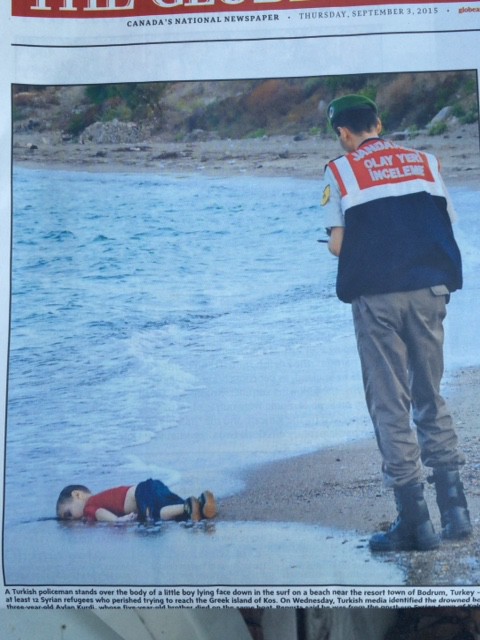September 29, 2015
Chaotic Global Response on Refugees, Marchi
By Hon. Sergio Marchi
From http://ottawacitizen.com

When it came to migration, the world was once divided into “sending” and “receiving” countries, with migrants mostly seeking attractive, developed countries.
Globalization has since revolutionized the scale of human mobility. Today, migrants and refugees leave, enter, and transit through, every single country; big and small, rich and poor. Displaced people now number some 60 million. Migration has become an undeniably powerful and messy global phenomenon, one that demands a coherent global solution. Yet, despite the work of governments and NGOs, we are falling far short.
The scenes of millions of desperate Syrian refugees fleeing civil war reflects this mournful state of affairs. As well, their frightening travels pull at our heartstrings, with the lifeless image of three-year-old Alan having triggered an explosive outpouring of emotions in Canada and around the globe, propelling the issue forcefully into the federal election.
It always has been so. Past journeys of frantic escape involving Hungarians, Czechs, Vietnamese, Africans, East Asians and many others have repeatedly challenged our compassion. When someone asked the British PM, Harold Macmillan, what was the most difficult aspect about his job, he replied: “Events, dear boy, events.” And so it is with the refugee dilemma.
While the origins of refugees change, the script is the same. It’s all about man-made catalysts — war, poverty, politics, discrimination, corruption, and tyranny — that force people to risk everything and leave their homelands for something better. Knowing this history of cataclysmic occurrences, and given our imposing technological know-how, why is the international community responding so chaotically to today’s moving masses of humanity?
Political leaders must address the root causes. But realistically, that work is long term, and painfully slow.
In the short run, we citizens must show “heart.” A cri-de-coeur. A sense of humanity that plays to our better angels, and not to our fears and prejudices, as Hungary is exhibiting. Public solidarity is indispensable for prompting responsible political and social action.
But, heart alone is not enough. We also desperately need vastly more effective international governance structures if we are to transform our collective concerns into decisive, timely, and effective actions.
While the UN High Commission for Refugees and the International Organization for Migration are first among equals, our existing migration tools are too highly fragmented. An incredible 18 different UN agencies each share a piece of the mandate. That’s a recipe for systemic disaster and failure for both refugees and asylum countries. Under this committee, who’s in charge?
It’s also a double standard, since the UN does not dare manage other global issues, including trade, human rights, labour and health in the same way. Why do successive UN Secretaries-General and member states treat migration challenges with such contempt? And why, despite numerous reports and commissions, does nothing change?
Given today’s humanitarian crisis, and those to emerge in the future, our leaders have a duty to immediately reform an outdated and inadequate machinery. They could start by adopting the following 5 measures:
•First, they should fold the 18 different mandates — that makes no sense in today’s fast-moving world — into one, overarching, agile organization that works closely with states, NGO’s, and the private sector;
•Second, the new entity should be comprised of two separate, but interconnected departments — one each for refugees and migrants — supported by their respective policy/response teams;
•Third, they must sufficiently fund the new institution. The budget must be commensurate with the mammoth task at hand;
•Fourth, in choosing a person to lead the organization, they should avoid the discredited criteria that often characterizes UN selection processes. Let them empower someone who commands the experience and stature that this position calls for;
•Finally, all countries should support the work of the single international agency. Channeling our resources, ideas, and commitments will strengthen our capacity to make a compelling difference to peoples’ fates.
Some will dismiss this as “big government,” while others fear mixing refugee and migration policies. And some will insist on building walls.
I believe it’s not the size of governance that matters most. It’s how smart and efficient it is. As to the difference between refugees and migrants, I am confident that we can preserve that distinction while providing a quicker, more competent response.
And rather than walls, the only humane and orderly way forward is to build bridges of goodwill. Canada has had a tradition of progressive, value-added statecraft. It is time to rekindle that spirit and leadership, including using our voice to champion change at the UN.
Let the memory of little Alan and his devastated father inspire us to find a better way to help people when brutal events force them to move in such staggering numbers and cruel misery.
Sergio Marchi served as Canadian Minister of Citizenship and Immigration, Ambassador to the UN Agencies and WTO in Geneva, and Commissioner on the 2003 UN Commission on International Migration.



